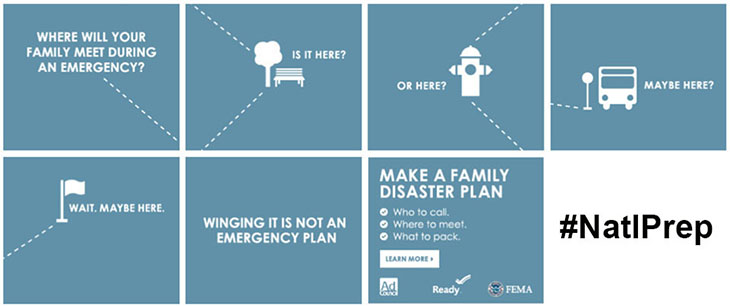September is recognized as National Preparedness Month which, as Ready.gov points out, serves as a reminder that we all must take action to prepare, now and throughout the year, for the types of emergencies that could affect us where we live, work, and also where we visit.
Why make a plan? Your family may not be together if a disaster strikes, so it is important to think about the following situations and plan just in case. Consider the following questions when making a plan:
- How will my family/household get emergency alerts and warnings?
- How will my family/household get to safe locations for relevant emergencies?
- How will my family/household get in touch if cell phone, internet, or landline doesn’t work?
- How will I let loved ones know I am safe?
- How will family/household get to a meeting place after the emergency?
Here is a template that you can download, print, and fill out:
- For parents (PDF)
- For kids (PDF)
- For transit commuters (PDF)
- For your wallet (PDF)
- Steps to make a plan (PDF)
- Tips on emergency alerts and warnings (PDF)
Here are a few easy steps to start your emergency communication plan:
Understand how to receive emergency alerts and warnings. Make sure all household members are able to get alerts about an emergency from local officials. Check with your local emergency management agency to see what is available in your area, and learn more about alerts by visiting: http://www.ready.gov/alerts.
Discuss family/household plans for disasters that may affect your area and plan where to go. Plan together in advance so that everyone in the household understands where to go during a different type of disaster like a hurricane, tornado, or wildfire.
Collect information. Create a paper copy of the contact information for your family that includes: phone (work, cell, office), email, social media. medical facilities, doctors, service providers and schools.
Identify information and pick an emergency meeting place. Things to consider: Decide on safe, familiar places where your family can go for protection or to reunite; Make sure these locations are accessible for household members with disabilities or access and functional needs; and if you have pets or service animals, think about animal-friendly locations.
Examples of meeting places:
- In your neighborhood: A mailbox at the end of the driveway, or a neighbor’s house.
- Outside of your neighborhood: library, community center, place of worship, or family friend’s home.
- Outside of your town or city: home of a relative or family friend. Make sure everyone knows the address of the meeting place and discuss ways you would get there
Share information. Make sure everyone carries a copy in his or her backpack, purse, or wallet. You should also post a copy in a central location in your home, such as your refrigerator or family bulletin board.
Practice your plan. Have regular household meetings to review your emergency plans, communication plans and meeting place after a disaster, and then practice, just like you would a fire drill.
The FEMA app — FEMA.gov/mobile-app — provides safety and preparedness tips for more than 20 natural and man-made hazards and allows you to stay informed of weather alerts in up to five locations across the nation where friends or loved ones live. The app also provides a customizable checklist of emergency supplies, maps of open shelters and recovery centers, and information on how to survive natural and man-made disasters. The FEMA app is free and available in the App Store for Apple devices and Google Play for Android devices.
About the author: Andrew McBrearty is a VA readiness operations specialist and an Air Force Veteran.
Topics in this story
More Stories
The Social Security Administration is hoping to make applying for Supplemental Security Income (SSI) a whole lot easier, announcing it will start offering online, streamlined applications for some applicants.
Yusuf Henriques, an Army Veteran and former combat medic, is the founder and CEO of IndyGeneUS AI, a genomics company on a mission to improve health equity by increasing representation of women and racial minorities in clinical trials.
Online shopping scams are the riskiest scam for Veterans, with 77.3% of reports confirmed losing money when targeted by this scam.







I have done a lot to prepare for whatever may happen I have taken the CERT course and have set up a base of operation in my home. I am also certified in first aid and have the means to take care of almost any problem that may come up. Because it is said the man who is unprepared is the one it will happen to and the one who is prepared will not even know that there is a problem.